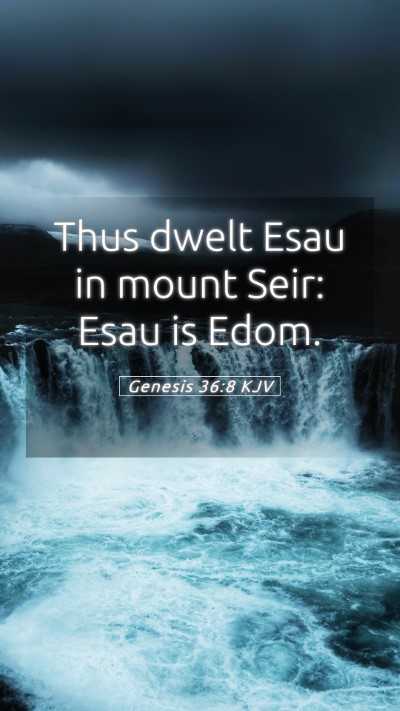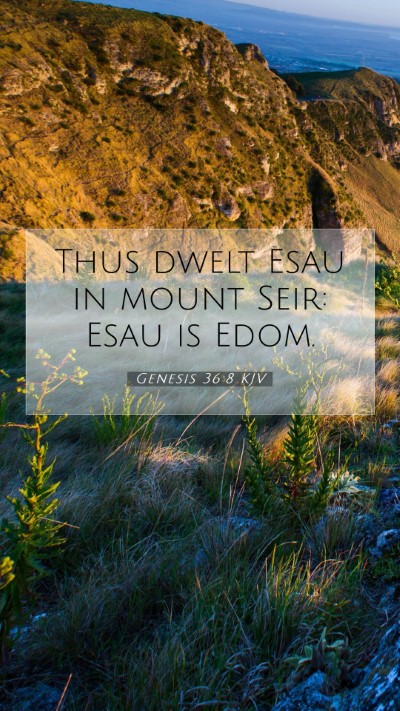Understanding Genesis 36:8 - Explanation and Commentary
Genesis 36:8: "Thus Dwelt Esau in Mount Seir: Esau is Edom."
Bible Verse Meaning
This verse serves as a historical account of Esau, the son of Isaac and brother of Jacob, taking residence in Mount Seir, which is significant for understanding the lineage and geographical allocations of the descendants of Esau, known as the Edomites.
Bible Verse Interpretations
Commentaries from various biblical scholars provide insights into this verse's implications:
- Matthew Henry: Henry emphasizes the importance of understanding Esau’s choice to live in Mount Seir, depicting it not just as a location but as part of God’s sovereign distribution of lands among the descendants of Abraham. He notes that this reflects Esau’s departure from the covenantal promise given to Jacob, which adds depth to the narrative of familial conflict.
- Albert Barnes: Barnes points out that the naming of Esau as Edom indicates the redemptive aspect of his story. The term Edom, meaning "red," is tied to the significance of how names in biblical texts often carry deeper meanings regarding personal identity and future lineage. This adds a layer of understanding regarding the Edomites' historical relevance.
- Adam Clarke: Clarke elaborates on the geographical context, suggesting that Mount Seir was a rugged mountainous region containing notable fortifications which provided safety and distinct identity for Esau’s descendants. He links the passage to broader themes of survival and identity within the context of the Israelite narrative.
Bible Verse Understanding
Understanding this verse requires an analysis of both the historical context of the Edomites and their ongoing conflict with Israel. It raises questions about the significance of land and identity in biblical narratives.
Bible Verse Commentary
This verse represents a transition in the biblical narrative from the patriarchs to the establishment of nations. The territory of Esau is pivotal for understanding the dynamics of the ancient Near East and its socio-political circumstances.
Scripture Analysis
Further examination reveals that the mention of Esau residing in Mount Seir serves to foreshadow the legal and territorial conflicts that arise between the Israelites and the Edomites later in the narrative.
Cross References
- Genesis 25:30: This verse introduces the connection between Esau and his nickname, Edom.
- Deuteronomy 2:1-5: These verses recount the journey of the Israelites and their relationship with the Edomites.
- Obadiah 1:10-14: This prophet recounts the downfall of Edom, providing a contrasting view of their earlier prosperity.
Application of Genesis 36:8
The applications for modern readers may include understanding the concept of identity and belonging pointed out in this passage. Esau’s choice of residence reflects his character and destiny contrasting with his brother Jacob’s, which serves as a reminder about the importance of choices in shaping one's legacy.
Bible Study Insights
This verse offers rich insights for Bible study groups and individuals engaging in online Bible study. It showcases important themes such as the significance of land in biblical times and the enduring consequences of familial relationships in scriptural texts.
Historical Context of Genesis 36:8
To fully grasp the meaning of this biblical verse, one must delve into the historical context surrounding the Edomites and their interactions with the Israelites. Understanding these dynamics can enrich Bible study resources used in seminars or personal exploration.
Conclusion
Genesis 36:8 encapsulates significant themes of land, identity, and the long-lasting consequences of familial decisions. The verse serves as a springboard for deeper investigation into biblical histories and their implications on contemporary faith and understanding Scripture.


